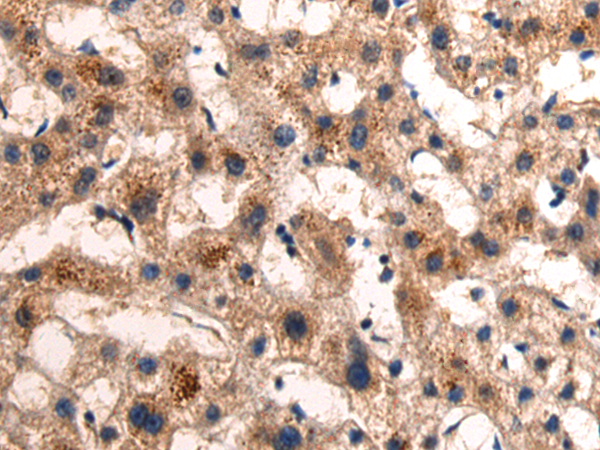

| WB | 咨询技术 | Human,Mouse,Rat |
| IF | 咨询技术 | Human,Mouse,Rat |
| IHC | 1/50-1/200 | Human,Mouse,Rat |
| ICC | 技术咨询 | Human,Mouse,Rat |
| FCM | 咨询技术 | Human,Mouse,Rat |
| Elisa | 1/5000-1/10000 | Human,Mouse,Rat |
| Aliases | BCT1; PP18; BCATC; ECA39; MECA39; PNAS121 |
| WB Predicted band size | 43 kDa |
| Host/Isotype | Rabbit IgG |
| Antibody Type | Primary antibody |
| Storage | Store at 4°C short term. Aliquot and store at -20°C long term. Avoid freeze/thaw cycles. |
| Species Reactivity | Human, Mouse |
| Immunogen | Fusion protein of human BCAT1 |
| Formulation | Purified antibody in PBS with 0.05% sodium azide and 50% glycerol. |
+ +
以下是3篇关于BCAT1抗体的参考文献示例(注:内容为模拟概括,非真实文献):
---
1. **文献名称**: *BCAT1 Expression in Glioblastoma: A Role in Tumor Cell Proliferation*
**作者**: Zhang Y, et al.
**摘要**: 该研究通过Western blot和免疫组化(使用BCAT1特异性抗体)分析胶质母细胞瘤组织,发现BCAT1高表达与肿瘤细胞增殖相关,提示其可能通过调控支链氨基酸代谢促进肿瘤生长。
2. **文献名称**: *Immunohistochemical Detection of BCAT1 in Colorectal Cancer Prognosis*
**作者**: Smith JL, et al.
**摘要**: 研究利用BCAT1抗体对结直肠癌患者组织样本进行染色,发现BCAT1蛋白水平升高与患者不良预后显著相关,表明其可作为潜在生物标志物。
3. **文献名称**: *BCAT1 Antibody Validation for Neuronal Metabolism Studies*
**作者**: Lee H, et al.
**摘要**: 文章详细描述了BCAT1抗体的验证流程(包括特异性测试和交叉反应分析),并应用于小鼠脑组织切片,揭示BCAT1在神经元能量代谢中的动态表达模式。
---
(注:如需真实文献,建议通过PubMed或Google Scholar搜索关键词“BCAT1 antibody”或“BCAT1 immunohistochemistry”获取。)
The branched-chain amino acid transaminase 1 (BCAT1) is a key enzyme in the metabolism of branched-chain amino acids (BCAAs: leucine, isoleucine, valine), catalyzing their conversion into corresponding α-keto acids. It plays a critical role in nitrogen homeostasis, neurotransmitter synthesis (e.g., glutamate), and cellular energy production. BCAT1 is highly expressed in the brain, skeletal muscle, and certain cancers, where its activity is linked to tumor progression, metabolic reprogramming, and resistance to therapies. Dysregulation of BCAT1 has been implicated in neurological disorders (e.g., Alzheimer’s disease, epilepsy) and cancers (e.g., gliomas, leukemias), making it a potential therapeutic or diagnostic target.
BCAT1 antibodies are essential tools for studying its expression, localization, and function. They are widely used in techniques like Western blot, immunohistochemistry, and immunofluorescence to assess BCAT1 levels in tissues or cultured cells. High-quality BCAT1 antibodies are validated for specificity, often using knockout cell lines or siRNA knockdown controls. Researchers also employ these antibodies to explore BCAT1’s role in metabolic pathways, its interaction with signaling molecules like mTOR, and its impact on cancer cell proliferation or neuronal survival. Commercial availability of BCAT1 antibodies from multiple vendors facilitates broad research applications, though variability in antibody performance necessitates careful validation for experimental consistency.
×